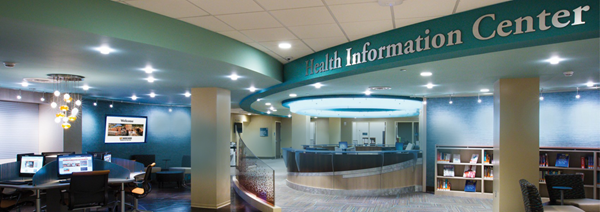KNOXVILLE, Tenn., Sept. 22, 2014 (GLOBE NEWSWIRE) -- Only 12 percent of Americans have proficient health literacy, according to the most recent National Assessment of Adult Literacy. The American Medical Association (AMA) reports individuals with limited health literacy incur medical expenses that are up to four times greater than patients with adequate literacy skills, costing the healthcare system billions of dollars every year in unnecessary doctor visits and hospital stays.
Aiming to improve these national health literacy statistics, as health literacy is an essential component to achieving excellent patient outcomes, The University of Tennessee Medical Center will open a Health Information Center on Monday, Sept. 22, explains Joseph R. Landsman, Jr., president and CEO of The University of Tennessee Medical Center.
"This unique facility offers an extensive consumer health library, virtual and printed resources and walk-in assistance with dedicated Preston Medical Librarians and library associates who are certified health information specialists that can help with research on specific health conditions," said Landsman. "These are the same university faculty who work with our physicians daily. All of these resources are available for UT Medical Center patients, caregivers, their families and the community, free of charge."
Landsman explains that health literacy is a person's ability to obtain, process and understand basic health information and services needed to make appropriate health decisions and follow instructions for treatment.
"The University of Tennessee Medical Center is committed to leading a charge in improving patient outcomes and the Health Information Center will be of tremendous benefit by providing information in the context of the hospital, and concurrent with the diagnosis and treatment of disease, the library may influence a number of areas of health and wellness," said Landsman. "As the region's only academic medical center, it is our responsibility to provide not only excellent healthcare but also to provide additional opportunities through education that can help our patients, their families and the community better understand wellness and disease processes."
Landsman explains statistics show that nearly nine out of 10 adults have difficulty using everyday health information that is routinely available. Furthermore, the cost of low health literacy to the U.S. economy is estimated at $106 to $238 billion annually. The lack of health literacy can result in skipping necessary medical tests, more emergency room visits and increased difficulty in managing chronic diseases.
The Health Information Center will provide enhanced patient-to-physician communication, which can result in better informed healthcare decisions," said Landsman.
"Health information has been shown to improve communication with the healthcare provider, increase patient compliance, reduce patient and family member stress levels, and change attitudes toward health," explains Sandy Oelschlegel, associate professor and director of the Health Information Center. "Having quality guidance on which resources to use to shape healthcare decisions is especially important, since the Internet is full of misinformation. Being in a position to help people evaluate health information to find current, valid and unbiased resources via the Health Information Center is a wonderful opportunity."
To attract patients and visitors, as well as physicians and other healthcare providers, the 10,600 square-foot facility is conveniently showcased in the main lobby of the Medical Center. Key amenities of the Health Information Center include:
- Dedicated space, resources and services to obtain accurate medical information
- Professional librarians who have received certification from the Medical Library Association in providing consumer health information services
- A collection of books on health and wellness topics
- Access to health and wellness databases
- Computers for patients and their families to research health topics
"An important benefit of the Health Information Center is that it provides all users, especially patients and their caregivers, with educational resources that are understandable," said Oelschlegel.
According to Landsman, the Health Information Center was fully funded by philanthropic dollars with donors contributing more than $4 million towards the effort.
"We believe the Health Information Center will empower patients and caregivers to take an active role in their healthcare, thus potentially shortening hospital stays and improving their overall quality of life," said Landsman.
The mission of The University of Tennessee Medical Center, the region's only hospital to achieve status as a Magnet® recognized organization, is to serve through healing, education and discovery. UT Medical Center, a 581-bed, not-for-profit academic medical center, serves as a referral center for Eastern Tennessee, Southeast Kentucky and Western North Carolina. The medical center, the region's only Level I Trauma Center, is one of the largest employers in Knoxville. For more information about The University of Tennessee Medical Center, visit online at www.utmedicalcenter.org.
A photo accompanying this release is available at: http://www.globenewswire.com/newsroom/prs/?pkgid=27851
